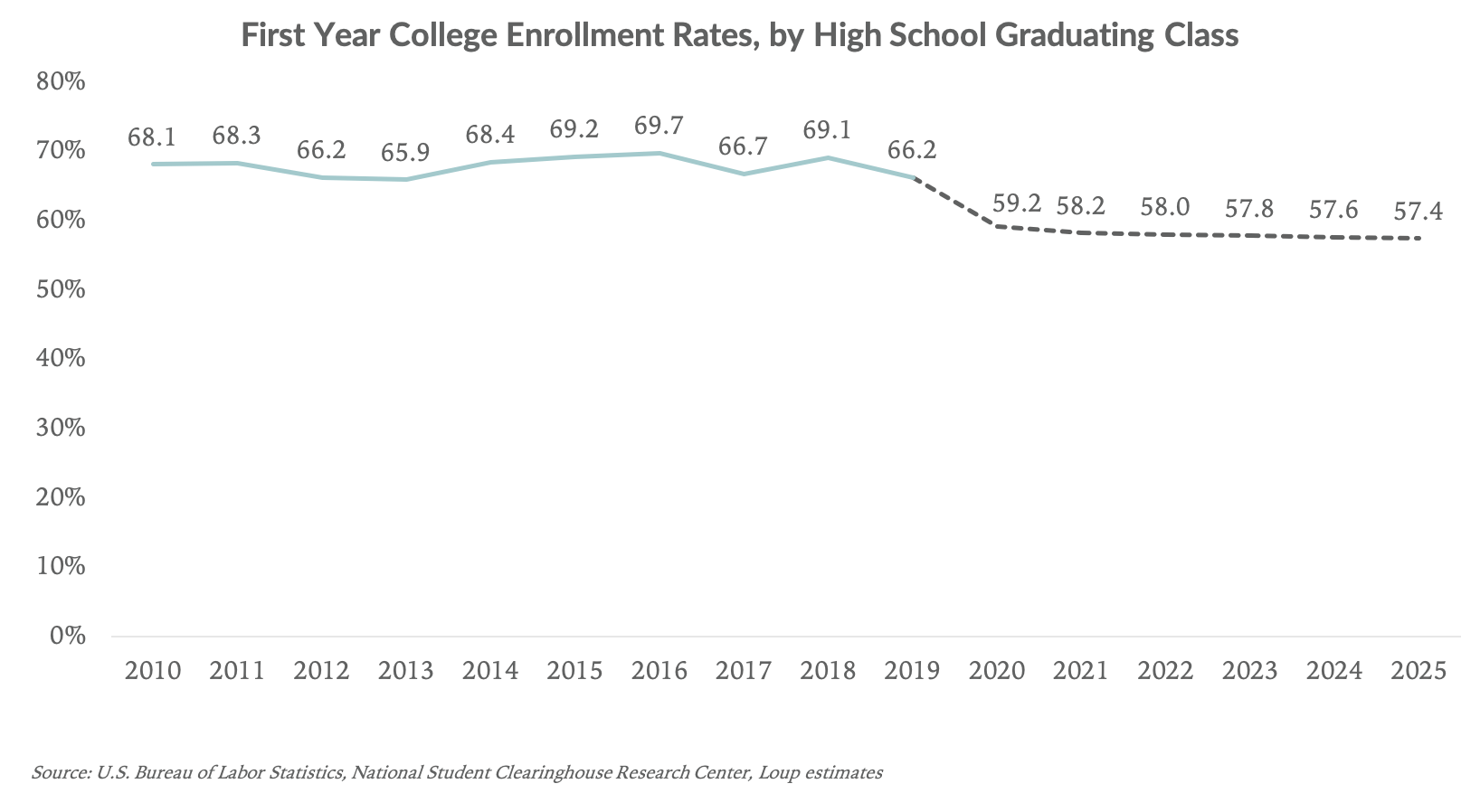Add higher education to the list of sectors undergoing a pandemic stress test, highlighting its strengths and weaknesses. Every year, about 3.2m students graduate from high school. The percentage that enrolls in college has hovered between 65% and 70% for the past decade.

Following a roughly 3 percentage point decline in 2019 over 2018, current data from the National Student Clearinghouse Research Center suggests a 7-8 percentage point decline in 2020, as more students choose to work or take a gap year. Additionally, there are indications that 2021 enrollment rates will decline further, given Free Applications for Federal Student Aid (FAFSA) are down almost 15% y/y for the upcoming high school graduating class. While FAFSA doesn’t cover all college, enrollees and vaccines should improve the likelihood colleges are open next fall, we estimate 2021 enrollment rates will decline an additional 1 percentage point to 58.2%.
With this backdrop, we believe the higher ed space is ready for disruption, given a confluence of factors. First, there is long-standing skepticism among students and parents about the value of a college degree, which has been accentuated by the pandemic. Second, young adults are looking for ways to hack higher ed, through outlets such as YouTube (ask a student if they use YouTube to help with homework) and Khan Academy, as well as work-education alternatives that provide students an income while they earn a degree. Putting it together, we believe college enrollment rates will stabilize over the next five years between 57% and 60%, down from the 65%-70% range over the past decade. Beyond five years, we anticipate further fractional annual declines in college enrollment rates. That creates an opportunity for companies to step in and fill the accreditation gap.
Traditional college’s growing skeptics
The top cited reason for going to college is to secure a good job, theoretically providing higher income and lifetime earnings. A 2019 survey by Gallup and Strada Education Network showed 70% of college students agree or strongly agree that they will graduate with the knowledge and skills they need to be successful in the job market. That leaves a sizable portion, 30%, that question the earning power of their degree.
Separately, a September 2020 survey from Strada found 35% of current college enrollees said their university does an “excellent” or “very good” job at connecting education to a meaningful career. Given finding a good job is the primary motivation for college attendance, it’s not a surprise that the same survey found only 50% of currently enrolled students at four-year institutions believe their “education will be worth the cost.” While the pandemic has undoubtedly pressured this 50% survey result, the percentage has been moving down since 2016, when we estimate it was closer to 75% or higher, based on commentary from Strada.
It’s not just students that doubt the value of traditional college. A 2019 survey by Kaplan found only 47% of parents feel colleges are doing a good job preparing their children for the workplace, and 57% question whether college costs justify the value of a degree.
We believe these views are shaped in large part by the steep and growing cost of college, along with record student loan debt. The average annual cost of college including tuition and room and board at a four-year institution is around $30,000, up from about $18,500 in 2000. For a point of reference, cumulative inflation over the past twenty years is 54%, compared to a 62% increase in college costs over the same period. The average loan debt for college graduates is more than $30,000, and it takes on average 10 to 20 years to repay it, depending on the loan structure.
High tuition cost frustrations have been on the rise over the past nine months, given most universities have kept tuition costs steady despite the majority of classes being moved to Zoom. While there is an argument that the same material is being communicated, the perceived value of online learning is lower compared to in-person classes.
Online universities have a brand problem
Over the next decade, we believe students will increasingly bypass traditional college in favor of alternative learning experiences, some of which will carry the same college accreditation without its high cost. Today, the most popular substitute to bridge the gap between the high cost of education and accreditation is an online-only higher ed program. The University of Phoenix is the best known example of this option, with annual average tuition costs of about $10,000. While this approach significantly reduces the cost of college, it fails to produce a degree that employers want, given online programs have failed to establish credibility with employers. The end result is an online-only degree that largely fails to deliver higher lifetime earnings for the student.
A better path to a college degree, leveraging employer brands
Tech has opened the door for different learning avenues such as podcasts, YouTube, and free online courses. Highly motivated people utilize these avenues to learn skills that help them perform well at a job. Unfortunately, the DIY approach to higher ed comes up short because it lacks accreditation, which employers use as a filtering mechanism in making new hires.
An emerging alternative to college are programs that connect college degrees to employers. One example is Craft, a Loup portfolio company. Craft partners with employers to turn on-the-job training and classroom instruction (provided by Craft) into an accredited degree for employees. For example, if McDonald’s worked with Craft, the student (a McDonald’s employee) could earn a BA or Associate’s degree from “McDonald’s University” with an emphasis in logistics. Spoiler alert: at its core, McDonald’s is a logistics company. We believe in the future, employers will value a college degree from McDonald’s at the same or higher level as many traditional colleges. Top tier schools need not worry, their brands will remain intact.
College’s enduring defensibility, the social experience
We think students attend college primarily for two reasons: to secure a well-paying job and the social experience. We believe alternatives such as Craft can compete with the first reason. As forward-looking tech enthusiasts, we can imagine, over the next twenty-five years, the VR metaverse emerges as a viable social alternative. Absent that, the social experience of college is impossible to replicate today, and will therefore be higher ed’s enduring competitive advantage.
A degree still matters, how you attain it doesn’t
Since the mid 20thcentury, consensus has been that attending college is the surest way to climb the income ladder. There’s good basis for this view, as the median Bachelor’s degree holder enjoys a 65% plus wage premium compared to the median high school graduate. This fact illustrates the importance of a college degree for income mobility, yet says nothing about how one should obtain it. In the future, we believe there will be more learning-rich and cost-effective ways to earn a degree that signals competence to employers.
